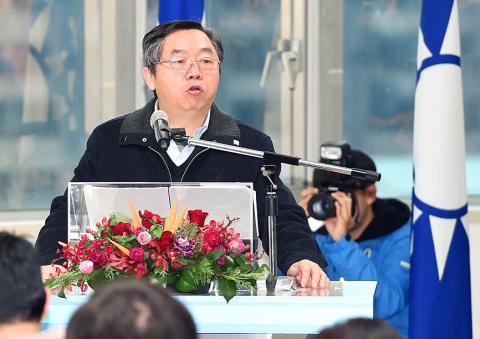The Chinese Nationalist Party (KMT) yesterday said it is considering collecting a “special party fee” and raising the contribution amounts required by KMT cadres and public office holders, in a last-ditch effort to remedy what the party called an “unprecedented financial crisis.”
“The challenge facing the KMT is unprecedented, as is its current financial crisis. To make matters worse, the passage of the Political Party Act (政黨法) last month significantly restricted the engagement of political parties in profit-making activities,” KMT Administration and Management Committee director Chiu Da-chan (邱大展) said in his report on the party’s financial situation at a meeting of the KMT Central Committee in Taipei yesterday.
It was the first meeting of the 210 members of the Central Committee since they were elected in September.

Photo: Liao Chen-huei, Taipei Times
To keep from being dependent on borrowed money, the party plans to levy a “special party fee” on party members and require KMT cadres and public officials to contribute more to the party, Chiu said.
“We are still discussing what a reasonable amount would be for local office holders to contribute and we will let everyone know once we decide,” Chiu said.
In November last year, then-KMT chairwoman Hung Hsiu-chu (洪秀柱) passed a regulation that stipulated the amount that each high-level party member would need to raise annually. The regulation was an attempt to alleviate the party’s financial straits amid ongoing efforts by the Ill-gotten Party Assets Settlement Committee to recover party assets allegedly acquired illegally during the nation’s authoritarian era.
The regulation requires the KMT chairperson and vice chairs to each raise NT$10 million, while special municipality mayors must raise NT$2 million and party lawmakers NT$500,000.
According to Chiu, KMT Chairman Wu Den-yih (吳敦義) has borrowed NT$140 million since he assumed the chairmanship to pay the party’s monthly administrative and personnel expenditures, which total NT$30 million.
“There are hidden liabilities,” Chiu said, citing the party’s downsizing plan in January, which includes 719 laid-off staff receiving a total of NT$970 million in severance pay and pensions, and pension payments to retired staff, an amount to be decided in an ongoing negotiation.
Meanwhile, the KMT has only NT$10.1 million in disposable cash in its bank accounts, Chiu said, as NT$10.5 million of the party’s savings have been frozen.
The Chang Yung-fa Foundation has also yet to pay NT$100 million owed to the party for the company’s acquisition of the former KMT headquarters in Taipei’s Zhongzheng District (中正) in 2006, Chiu added.
Despite allegations that the party possesses overseas assets worth hundreds of billions of New Taiwan dollars, the KMT only owns real estate with a combined worth of NT$2 billion, including land measuring 33,000m2 and buildings with more than 50,000m2 in floor space, Chiu said.
“Although Central Investment Co (中投資產) is owned by the KMT and has NT$34.8 billion in assets, its net worth, after excluding liabilities, is only NT$15.3 billion — and that money has all been frozen,” he said.
The Ill-gotten Party Assets Settlement Committee in November last year ruled that Central Investment Co was a KMT-affiliated organization and prohibited it from disposing of its assets.

ANOTHER EMERGES: The CWA yesterday said this year’s fourth storm of the typhoon season had formed in the South China Sea, but was not expected to affect Taiwan Tropical Storm Gaemi has intensified slightly as it heads toward Taiwan, where it is expected to affect the country in the coming days, the Central Weather Administration (CWA) said yesterday. As of 8am yesterday, the 120km-radius storm was 800km southeast of Oluanpi (鵝鑾鼻), Taiwan’s southernmost tip, moving at 9kph northwest, the agency said. A sea warning for Gaemi could be issued tonight at the earliest, it said, adding that the storm is projected to be closest to Taiwan on Wednesday or Thursday. Gaemi’s potential effect on Taiwan remains unclear, as that would depend on its direction, radius and intensity, forecasters said. Former Weather Forecast

As COVID-19 cases in Japan have been increasing for 10 consecutive weeks, people should get vaccinated before visiting the nation, the Centers for Disease Control (CDC) said. The centers reported 773 hospitalizations and 124 deaths related to COVID-19 in Taiwan last week. CDC Epidemic Intelligence Center Director Guo Hung-wei (郭宏偉) on Tuesday said the number of weekly COVID-19 cases reported in Japan has been increasing since mid-May and surpassed 55,000 cases from July 8 to July 14. The average number of COVID-19 patients at Japan’s healthcare facilities that week was also 1.39 times that of the week before and KP.3 is the dominant

The Chinese Communist Party’s (CCP) working group for Taiwan-related policies is likely to be upgraded to a committee-level body, a report commissioned by the Mainland Affairs Council (MAC) said. As Chinese President Xi Jinping (習近平) is increasingly likely to upgrade the CCP’s Central Leading Group for Taiwan Affairs, Taiwanese authorities should prepare by researching Xi and the CCP, the report said. At the third plenary session of the 20th Central Committee of the CCP, which ended on Thursday last week, the party set a target of 2029 for the completion of some tasks, meaning that Xi is likely preparing to

US-CHINA TRADE DISPUTE: Despite Beijing’s offer of preferential treatment, the lure of China has dimmed as Taiwanese and international investors move out Japan and the US have become the favored destinations for Taiwanese graduates as China’s attraction has waned over the years, the Ministry of Labor said. According to the ministry’s latest income and employment advisory published this month, 3,215 Taiwanese university graduates from the class of 2020 went to Japan, surpassing for the first time the 2,881 graduates who went to China. A total of 2,300 graduates from the class of 2021 went to the US, compared with the 2,262 who went to China, the document showed. The trend continued for the class of 2023, of whom 1,460 went to Japan, 1,334 went to